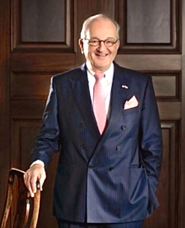Consumers Should Be Major Concern, Says WDC's Asscher
November 11, 14
 |
"Consumers will continue to be more discerning in their choices and more sophisticated in the way they research and make those choices," he said, adding "the consumer is our only source of value and it is up to us to demonstrate to them that" a diamond purchase is a wise choice.
"We should always remember that millions of people are depending on the well-being of the diamond industry for their livelihoods. From the miners and their families in the producing countries through to the polishing and trading centers, the jewelry manufacturers and the retailers, we all need to face the future and contribute together to make the diamond world a better, safer and more transparent industry. We can only do so if we work together. United we are much stronger than the sum of our parts.
"I call on all of us here present today and those working in and associated with our business around the world, to work in unison to protect the integrity of our product. In the end our mission is to strengthen the confidence of the consumer and to leave a better diamond world for the future generations who work in our fantastic industry.
Asscher said that as the newly elected president of the WDC, which has represented the diamond industry at the Kimberley Process for more than a decade: "I would like to assure that the WDC will continue in that role and carry on supporting the KP's essential work and its objectives. The mission of the WDC is of course to support and improve the working and impact of the KPCS.
"WDC will promote and stress the correct implementation of the standards around the world. All members should use the same methodology, the same methods with the same discipline, and those involved should have access to the same knowledge base. But this will require increased co-operation and support for those who experience difficulties to achieve these objectives," he said.
He explained that another element of the WDC's mission is to encourage the KP to address the various challenges facing the KP arising from business practices that could potentially impact KPCS compliance. One of them is the implied risk to the integrity of the KPCS as mentioned in the Financial Action Task Force report of 2013.
He said it was "a pleasure to work closely together" with the Civil Society coalition. "Civil Society and the WDC have the same goals, although we acknowledge that we do not always agree on the best way to achieve those goals, or what issues are relevant for discussion in the effective implementation of the KP. But I am looking forward to working closely with Alan Martin and his team."
I think we all agree that improving the way we manage and maintain knowledge and institutional memory is crucial to the future effectiveness of the Kimberley Process. His Excellency, Mr Wei and myself, representing the World Diamond Council, signed the agreement for the last July in Antwerp; it operates with the generous support of the Antwerp World Diamond Center, the Israel Diamond Institute, the Gem and Jewellery Export and Promotion Council of India and the Diamond Development Initiative on behalf of the WDC.
He also said that he planned to propose an additional role for the Administrative Support Mechanism (ASM). "We shall start working on the training aspect of new participants and officials. Over the years many participants and those working within the KP move on and others take their place on a frequent basis. We must be able to offer them training for a better understanding of the KP standards and working methods. The ASM is now also serving, besides a general support function, as a collective memory and knowledge base for all involved."
Asscher also made mention of the Ebola crisis in Western Africa. "All of us must address the tragedies and the economic impact this virus has on so many people and amongst diamond mining communities in West Africa.